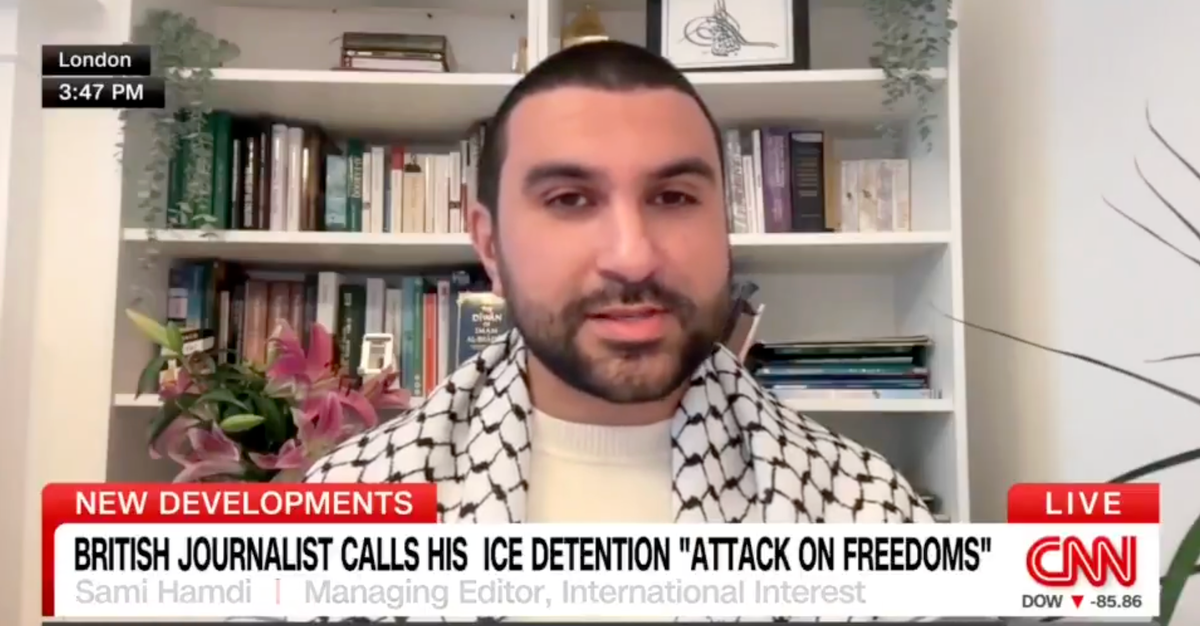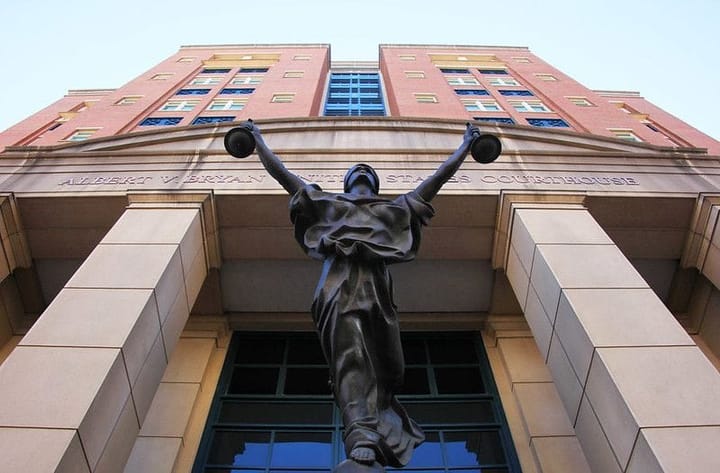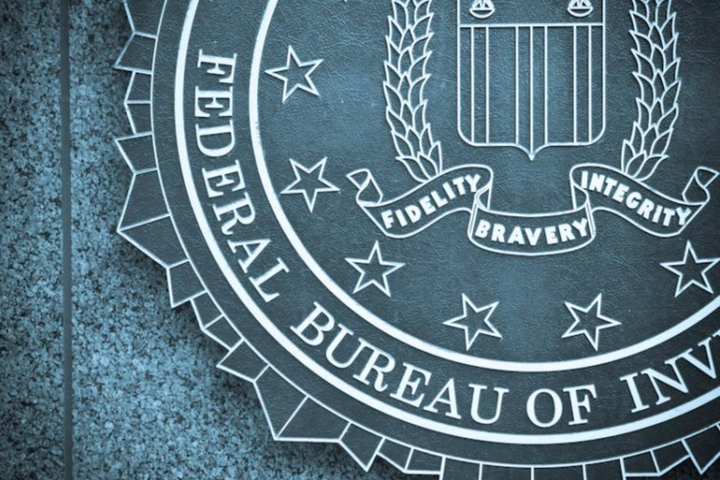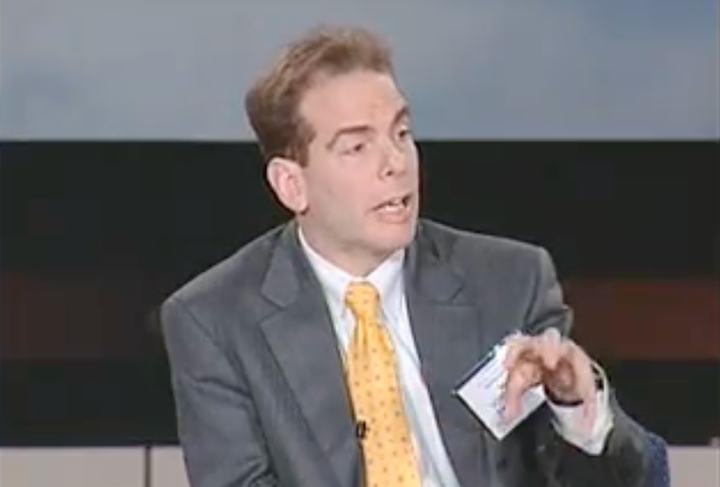'I Hurt The Oppressor': British Journalist Sami Hamdi Recounts ICE Detention
"My voice was powerful enough that they couldn’t leave me alone. They had to put me in detention for two weeks."

British journalist Sami Hamdi, who was recently released from ICE detention in the United States, recounted what he experienced during an online discussion organized by the Freedom of the Press Foundation.
Hamdi had a valid visa and a ticket for a domestic flight to Tampa, Florida, where he was scheduled to speak at a banquet for the Council on American-Islamic Relations (CAIR). Yet as a result of pressure from anti-Muslim activists Laura Boomer and Amy Mek, the State Department revoked his visa, and he was held in confinement for around 18 days.
On October 26, the Department of Homeland Security took him into custody at the San Francisco International Airport. His detention and removal was in retaliation for his speech in support of Palestinian human rights and against the Israeli government’s genocide in Gaza.
While searching for the gate for his departure (and after he went through airport security), according to Hamdi, an agent waiting for him said your visa was revoked two days ago and now you’re here illegally. No one had informed Hamdi that his visa was no longer valid so he demanded proof of this allegation.
The agent pulled out a State Department memo, and Hamdi noticed that the document contained no charge or reason for detaining him. It simply commanded that he be arrested or detained by officers.
Hamdi asked if he could buy a ticket to London and leave the country, but the agent said that is not how this works. Then five agents appeared around him.
“They escorted me out of the airport, and I find a black car with tinted windows waiting for me. They said to me, sir, please get into the car, and I said to him this feels like a movie. I’ve seen this where you throw somebody into a car, etc,” Hamdi recalled. “I’m a British citizen with rights. I’m not getting into the car. I want to use my phone to call a lawyer, to call somebody who can advise on my rights and what to do in this situation.”
He was granted one minute so he called CAIR, and they said find out where you are going. The agents would not tell him.
After asking if he could also contact his family, an agent grabbed Hamdi and threw him on a car. They handcuffed his hands behind his back “really tightly.” He was thrown into the car and driven a half hour to an ICE processing center.
Agents, as Hamdi recalled, put him in a cell. He waited two hours until they came and handed him a piece of paper that said he was guilty of what he was charged with doing and that he agreed to the “deportation order.” Of course, Hamdi refused to sign the order because he had a B-1/B-2 visa that permitted him to visit the U.S. for six months a year. It was valid until 2028.
When Hamdi would not agree to his removal, agents took Hamdi to the back of a van. “And this is wild. I mean, I expect it maybe in Tunisia, where my father’s from, but in America, this was a very surreal experience.”
In the van, Hamdi sat with cuffs on his hands and legs and a chain around his body. Nobody would tell him where agents were taking him. The trip took four to five hours, and he was unloaded from the van and put into a black car at one point.
Hamdi was brought inside an ICE detention center in McFarland, California, commonly known as the Golden State Annex. He watched an agent during check-in ask a Latino man about his country of origin. The man jokingly replied Afghanistan, which led the officer to say, “Your people want to kill my people.” The Latino man looked terrified, and immediately, he regretted the poor joke. The officer’s comment was an “insight into the mentality” of the people guarding detainees.
Hamdi recalled being brought to a hall with nearly 100 people that was “clearly overcrowded.” He was granted five minutes to make phone calls to his lawyers and family. Soon after he had a meal, too—“sweet corn with black spots on it,” and “beans that tasted like they [were past expiration].”
During detention, there was a period where Hamdi felt “agonizing pain.” He asked for medical treatment, yet hours went by without any doctor visiting him. A guard then told him the doctor had been around for the past three hours. In order to see the doctor, the guard suggested that he drop on the floor right now otherwise they would not agree to see him.
Hamdi also recounted how he was told that ICE would be taking him to Fresno, California. The fear was that he could be flown to Texas or Florida. Again, he was cuffed tightly and transported to this facility. Fifteen people in a small cell were handed yoga mats for sleeping. The officers would not remove the cuffs.
“I’m going blue,” Hamdi told the guards the following morning. They dismissed his complaint.
In Fresno, he was informed that his court date on November 6 was moved to November 10. They changed case details, like where he landed (Santa Ana, California) and where he was cleared for U.S. entry (Calgary). That allowed them to delay his access to a judge.
“By the way, would you like to sign the deportation [order] and go home right now?” asked the officer.
Hamdi said he was held in detention in Fresno until 10 p.m., when agents transported him back to the Golden State Annex. Upon return, the warden recognized him as the “famous guy.” He felt that his treatment slightly improved due to media attention.
The panel discussion additionally focused on the case of Ya’akub Ira Vijandre, a community journalist and DACA recipient who was detained outside of his home in Texas. Similarly, he was targeted by authorities for his social media postings that covered pro-Palestinian protests. (I’ll focus on Vijandre’s case in a later post.)
Soumaya Hamdi, the wife of Sami Hamdi, spoke about the scary allegations that were made against her husband. The “silver lining” was that there was an “incredible outpouring of support globally from the community”—Muslims and non-Muslims, journalists and non-journalists, social media influencers, the legal team, etc.
She experienced firsthand the exploitative nature of her husband’s detention, too. Not only did they attempt to silence him, but while in custody, it felt like they were trying to make as much money off this injustice as possible through “ICE tablets” and then the food and drink vending machines that only took quarters.
Sami Hamdi could purchase food and drinks when he saw visitors, however, he was not allowed to take anything bought in the facility back to where he was confined.
While discussing the free speech implications, CAIR attorney Hassan Ahmed said the U.S. government was “taking a shredder to the First Amendment.”
Civil rights attorney Chris Godshall-Bennett contended, “When the government detains you because of your speech in order to prevent you from speaking again, that strikes me as the most extreme form of prior restraint that could possibly exist.”
Most ICE detainees do not have the ability to fight this unjust treatment like Hamdi did. But Hamdi had the courage to very publicly challenge ICE in order to further expose their actions.
Marium Uddin, the legal director of the Muslim Legal Fund of America, said Hamdi’s “whole risk calculus was if I stay in custody, how much more maximized opportunity is there to do good?”
Hamdi spoke with pride. “I hurt the oppressor. I made it so that the oppressor had to detain me for two weeks.”
“My voice was powerful enough that they couldn’t leave me alone. They had to put me in detention for two weeks. And even better than that, everybody came out, which meant they couldn’t keep me in [detention].”
“There is nothing more fun in this job than making the oppressor lose sleep,” Hamdi added. “There is nothing more fun in this job than knowing that you have the ability to make a difference.”
In a show of solidarity with those with less power to mobilize opposition, Hamdi shared stories about detainees or asylum seekers that he met in custody. They’ve either had their court dates pushed back, or they have not been released because the government cannot find a third country to take them.
Hamdi insisted that more focus be put on the conditions of detention than just the people who are detained.
“It’s such a tragic injustice what ICE are doing to these people,” Hamdi concluded. “And I think the reality is that the ICE officers know it. All it takes is for a concerted effort to put a spotlight on that, and my dream is that it gets dismantled for the atrocities that they’re committing in these facilities.”
Watch and listen to the Freedom of the Press Foundation's panel discussion on ICE's targeting of pro-Palestinian journalists here.




Comments ()